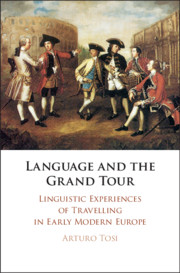Book contents
- Language and the Grand Tour
- Language and the Grand Tour
- Copyright page
- Dedication
- Dedication
- Contents
- Figures
- Preface
- Acknowledgements
- Chronology
- Introduction
- Part I Attitudes and Aptitudes
- 1 Images and Stereotypes
- 2 Attractions, Affectations, Aberrations
- 3 Linguistic Training at Home
- Part II Encounters and Exchanges
- Part III Contrasts and Collisions
- References
- Index of Names
- Subject Index
3 - Linguistic Training at Home
from Part I - Attitudes and Aptitudes
Published online by Cambridge University Press: 23 March 2020
- Language and the Grand Tour
- Language and the Grand Tour
- Copyright page
- Dedication
- Dedication
- Contents
- Figures
- Preface
- Acknowledgements
- Chronology
- Introduction
- Part I Attitudes and Aptitudes
- 1 Images and Stereotypes
- 2 Attractions, Affectations, Aberrations
- 3 Linguistic Training at Home
- Part II Encounters and Exchanges
- Part III Contrasts and Collisions
- References
- Index of Names
- Subject Index
Summary
In the Elizabethan period, the educational value of modern vernaculars – English, French and Italian – had already begun to attract the attention of famous scholars. While the strong interest in language teaching was linked to the appreciation and enjoyment of the country’s literature and cultural refinements, the market for a more utilitarian approach to learning modern languages was expanding too. In the second half of the sixteenth century, teachers exploited a mnemonic technique based on switching from language to language as it was assumed that modern language learning could benefit from the model of practising various types of dialogues. This was a method of medieval origins, used to teach readers to deal with practical situations as well as academic debates. Once applied to modern language teaching, the focus switched from learned disputations to everyday conversations. As the seventeenth century progressed and England became more conscious of its own cultural identity and economic power, learning modern languages tended to become more practical and utilitarian. Classical studies and literary training still occupied a prominent role in education but the study of modern languages was gradually fine-tuned to fit an instrumental vocation.
Keywords
- Type
- Chapter
- Information
- Language and the Grand TourLinguistic Experiences of Travelling in Early Modern Europe, pp. 80 - 104Publisher: Cambridge University PressPrint publication year: 2020

